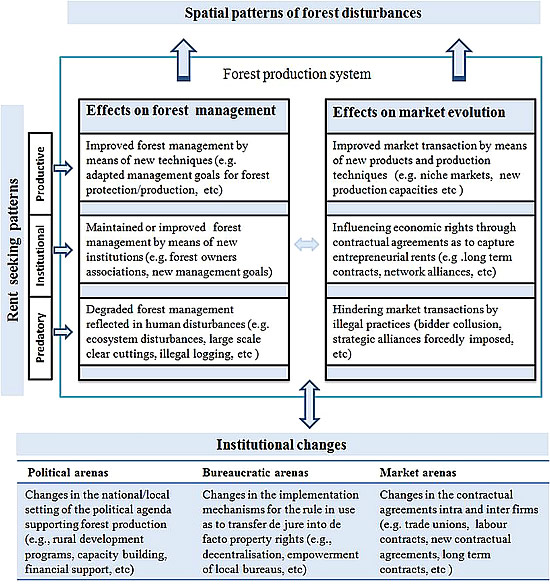| |
A theoretical approach to institutional entrepreneurship in the forest sector
The general aim of the INFORMA project is to provide better understanding of the effects of institutional entrepreneurship practices within the forest production sector and therefore to realise a sound analysis to support forest owners, resource managers and decision makers in optimizing the responsible forest management and to improve the implementation of good governance principles.
The approach taken in this research considers that social institutions, defined as ‘the rules of the game’ (North, 1990:3) create the framework for the sustainable forest management. “Institutions” are rules in use that establish what people may do, must do, or must not do in a specific situation (Ostrom et al. 2002). Institutions may be formal (written) or informal. From a sociological point of view, an institutional setting implies societal solutions to the problems of property rights, governance structures or rules of exchange (Fligstein, 1996).
The research takes into account that the efficacy and efficiency of the forest production system depends on how ‘the rules for the forest sector’ and ‘the rules within the forest sector’ are created, maintained and enforced.
The bridge between socio-economic and remote sensing
The formal and informal institutions used to implement sustainable forest management in Romanian have different degrees of acceptance and compliance. The result is that the post-communist transition process induced a broad scale disturbance with effects in various types of forest ecosystems and with specific manifestations (Griffits et al, 2012; Knorn et al., 2012).
Such patterns can be assess through an integrated methodology including socio-economic data, forest measurements, satellite images, geographic information systems (GIS) data (Green et al. 2005). In this context, forest disturbance mapping by post-classification image analysis was successfully applied in target areas from Central and Eastern Europe (Romania, Ukraine, Poland) and could represent an essential start point in broad scale analysis of forest management (Kuemmerlee et al, 2009; Olofsson et al., 2011; Griffiths et al, 2012; Knorn et al., 2012).
The transition period towards the market economy faced by Romania offers therefore a relevant “natural experiment” to study a dynamic process, characterised by changes in the institutional setting of property rights systems. Privatisation in forestry has been a sensitive issue for Romanian politicians, with the state continuously trying to maintain a high share of public ownership of forest resources. The Romanian case can thereby bring relevant contributions regarding the effects of institutional entrepreneurship in emerging fields, in conditions of high uncertainty, low degree of institutionalised structures and high bureaucracy.
Research objectives
The general objectives of this proposal are organized in two directions that examine: (1) the identification of the broad scale effects of different rent-seeking behaviours in the management of forest resources and (2) the understanding of institutional entrepreneurship through identifying motives, drivers and arenas occurring in the context of forest management and market evolution.
The operational objectives of the research proposal are:
- to compare, categorize and quantify, using remote sensing tools and field inventory, structural patterns of management in state vs. private forests, at a regional scale (Q1);
- to delineate, by linking remote sensing tools to sociological tools, a typology of management attitudes of resource owners corresponding to different structural forest patterns (Q1);
- to identify, by means of econometric and geomatics instruments, rent-seeking behaviours influencing market transaction and their impact on forest management patterns (Q2);
- to integrate the identified institutional entrepreneurship practices in the context of forest governance in post-communist countries (Q3).
Methodology
Having as the starting point the explorative entrepreneurial rent-seeking behaviours identified in the context of Romanian private forestry (Nichiforel and Schanz, 2011), the research is designed based on an interdisciplinary approach which links concepts and methodological approaches from socio-economics, geomatics and forest ecosystem management.
 Expected results
The project INFORMA aims to advance the understanding of entrepreneurial behaviours in changing the institutional boundaries in which the forest production system is embedded, rather than to generalise the application of existing theories of institutional changes to forestry. The innovative scientific outcomes resulting from applying this research perspective are dual:
1. On a theoretical level, the research will expand the borders of existing theories of rent-seeking by adding an entrepreneurial perspective to processes of institutional changes specific for forest management. The findings can provide valuable indicators in the governance of institutional competition (e.g. interest groups, directions of lobby, the distribution of power in the forest system).
2. On a methodological level, the research provides and innovative approach as it integrates interdisciplinary concept and it looks at all relevant actors and arenas beyond the traditional forest management.
|



















